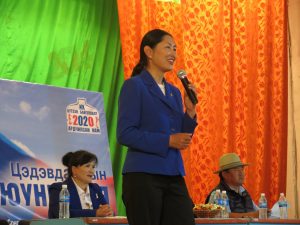On January 2, Ts. Oyungerel, a former member of Mongolia’s State Great Khural, announced that she will compete to be the Democratic Party’s candidate in the June 2021 presidential elections. She could possibly become the second-ever woman to run for Mongolia’s presidency following N. Udval’s unsuccessful bid in the 2013 elections.
Oyungerel, who turns 55 this year, obtained her first degree in economics in Sverdlovsk (known as Yekaterinburg today) in the Soviet Union in 1988, and further attended Moscow International Business School in 1993 for an MBA. She earned again a Master’s degree in International Policy Research at Stanford University in 2004. In 2011, she took part in the Eisenhower Fellowship Program, in which 60 to 70 global leaders are brought together for an intensive six-week program. She is also the author of the bestselling novel “The Green-eyed Lama,” set in Mongolia in the 1930s and 1940s.
Having been employed in various civil service posts during the 1990s and 2000s, she became an advisor on policies regarding human rights and citizen involvement to former President Ts. Elbegdorj in 2009, which cemented her reputation in the political field. In 2012, after two unsuccessful runs, she secured a seat in the State Great Khural.
Oyungerel has a reputation as a human rights activist and a leader of Mongolia’s Democratic Women’s Association. Not only does she touch upon some of the most crucial issues in society through her writings, but she continues to spearhead social wellness initiatives. Oyungerel has commenced a project to reinvent pit latrines in Ulaanbaatar’s ger districts using 17 different toilet-building technologies through Local Solutions Foundation, a non-governmental organization established in 2007. She emphasized that having squat toilets in a city as densely populated as Ulaanbaatar is unsanitary for the inhabitants and harmful to their health. Furthermore, heavily accumulated excrement is absorbed deep into groundwater, from which 1.5 million people get their drinking water.
When Oyungerel revealed her ambition to become the head of state, it left some in shock. Critics could not help involving her past and her family in the matter of her political career. There are two common – and preposterous – arguments as to why she cannot possibly run for the presidency. One is the claim that since she once worked for Elbegdorj, she must still be in his circle. (The former president has had a bad reputation since leaving office.) The second objection is that she is married to an American. Up to this day, the mere fact of a Mongolian woman getting married to a foreigner remains somewhat controversial. But beyond these objections, a number of Mongolian men and women find the idea of having a woman as the president quite disturbing.
It is too early to take her candidacy for granted in the upcoming presidential elections. First, Oyungerel will have to secure the Democratic Party nomination, which would require defeating incumbent President Kh. Battulga. Only then would she actually be able to run against against the Mongolian People’s Party’s pick, who is highly likely to be the current prime minister, U. Khurelsukh.
After 30 years of democracy, Mongolia continues to face trouble building good governance and developing a thriving economy. Still, is it one of the few democracies in the heart of Asia but is it ready to have a woman as the head of state?
Manduul Bat-Orshikh is a senior at the School of International Relations and Public Administration of the National University of Mongolia.

































